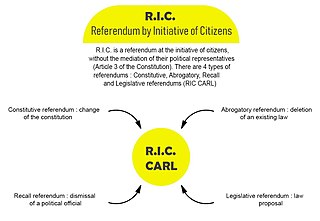
In political science, an initiative is a means by which a petition signed by a certain number of registered voters can force a government to choose either to enact a law or hold a public vote in the legislature in what is called indirect initiative, or under direct initiative, where the proposition is put to a plebiscite or referendum, in what is called a Popular initiated Referendum or citizen-initiated referendum.
A constitutional amendment is a modification of the constitution of a polity, organization or other type of entity. Amendments are often interwoven into the relevant sections of an existing constitution, directly altering the text. Conversely, they can be appended to the constitution as supplemental additions, thus changing the frame of government without altering the existing text of the document.
Referendums have been held in Australia to approve parliament-proposed changes to the Constitution of Australia or to the constitutions of states and territories.

Elections in Portugal are free, fair, and regularly held, in accordance with election law.

Referendums are held only occasionally by the Government of New Zealand. Referendums may be government-initiated or held in accordance with the Electoral Act 1993 or the Citizens Initiated Referenda Act 1993. Nineteen referendums have been held so far. Fourteen were government-led, and five were indicative citizen initiatives.

A constitutional referendum was held in France on 5 May 1946. Voters were asked whether they approved of a new draft Constitution proposed by the Constituent Assembly elected in 1945.

The Moldovan referendum of 2010 was a nationwide referendum in Moldova held on 5 September on whether or not the country should amend the Constitution of Moldova to return to direct popular election of the president. Since 2001, the president had been indirectly elected by Parliament, with a supermajority of 61 seats required for election. The voters are asked to answer the following question "Would you agree with the Constitutional amendment, which would allow the election of the President of the Republic of Moldova by the entire population?", voting for one of the proposed options: “Yes (for)” or “No (against)”. Of those who had cast their vote, 87.83% chose "Yes". However, the referendum did not pass because only 30.29% of voters turned out, short of the necessary 33% for the referendum to be considered valid.

A referendum on electoral reform was held in Botswana on 4 October 1997. The referendum had three separate proposals, and came following promises made by President Quett Masire after violent protests in 1995. All three proposals were passed, although voter turnout was only around 17%.
A non-binding constitutional referendum was held in Iceland on 20 October 2012. Voters were asked whether they approved of six proposals included in a new draft constitution drawn up by the Icelandic Constitutional Assembly. All six questions were approved by voters.

A constitutional referendum was held in Uruguay on 26 November 1989 alongside general elections. The proposed changes to the constitution would require state pensions to be increased at the same rate as the salary of civil servants. The proposal was approved by 81.78% of those voting and 72.51% of all registered voters.

A four-part referendum was held in the Federated States of Micronesia on 1 July 1999. Voters were asked whether a constitutional convention should be called, whether they approved of a proposal on the distribution of revenues from the country's exclusive economic zone (EEZ), whether the amount of tax revenues distributed to the states should rise from 50% to 70%, and whether states should be given exclusive ownership of their natural resources. The latter three had originally been planned to be held alongside the parliamentary elections in March, but were postponed due to a lack of funds to print the ballot papers.

A seven-part referendum was held in Ecuador on 28 August 1994. Voters were asked whether they approved of allowing independents to run in elections, whether the National Assembly should manage the state budget, whether to distribute the state budget by government department or region, whether to allow unlimited re-election for politicians, whether to elect members of the National Assembly in one or two rounds of voting, whether to allow dual citizenship, and whether the National Assembly should approve constitutional reforms within 100 days.

A three-part referendum was held in Ecuador on 26 November 2006, alongside the run-off for the presidential elections. Voters were asked whether they approved of a ten-year plan for education, plans to improve healthcare provision, and using oil revenues for social and economic programmes. All three proposals were approved by wide margins.

A fourteen-part referendum was held in Ecuador on 25 May 1997. Voters were asked whether they approved of the dismissal of President Abdalá Bucaram by the National Congress, the appointment of Fabián Alarcón as interim President for twelve months, the calling of a Constitutional Assembly, whether a Constitutional Assembly should be elected by direct elections or by appointment, whether spending limits should be introduced for election campaigns, whether voters should be able to modify electoral lists, whether National Assembly elections should be held alongside the first or second round of presidential elections, whether political parties that fail to cross the 5% threshold in two consecutive elections should be deregistered, whether the Supreme Electoral Tribunal (TSE) should reflect the political makeup of the National Congress, whether the National Congress should appoint managers of state-owned companies with a two-thirds majority, reforms to the justice system, allowing the Supreme Court to appoint judicial authority member, whether elected officials who commit a criminal offence should be removed from office, and whether the National Assembly should implement the 13 proposals. All eleven proposals were approved by voters.
Eleven national referendums were held in Switzerland during 2013. Voters approved six proposals related to spatial planning, executive pay, family policy, amendments to the laws on asylum and epidemics and an increase in the length of petrol station shop opening hours. The other five proposals on directly electing the Federal Council, abolishing compulsory military service, limiting salaries in a company to 12 times the lowest paid worker, tax credits for stay-at-home parents and an increase in road tax were rejected.
A fifteen-part constitutional referendum was held in Colombia on 25 October 2003. Whilst all fifteen proposals were approved by voters, only one question had a sufficient numbers of votes to pass the 25% quorum requirement.
A referendum is a direct vote in which an entire electorate is asked to either accept or reject a particular proposal. This article summarises referendum laws and practice in various countries.
An Icelandic Constitutional Council (Stjórnlagaráð) for the purpose of reviewing the Constitution of the Republic was appointed by a resolution of Althingi, the Icelandic parliament, on 24 March 2011. Elections were held to create a Constitutional Assembly (Stjórnlagaþing) body, but given some electoral flaws, had been ruled null and void by the Supreme Court of Iceland on 25 January 2011, leading the parliament to place most of the winning candidates into a Constitutional Council with similar mission. The question of whether the text of the proposed constitution should form a base for a future constitution was put to a non-binding referendum, where it won the approval of 67% of voters. However, the government's term finished before the reform bill could be passed, and the next government has not acted upon it.

A two-part constitutional referendum was held in Mauritania on 5 August 2017, having initially been planned for 15 July. Voters were asked whether they approve of proposed amendments to the constitution. Both proposals were approved by 86% of voters with a voter turnout of 54%.

The Référendum d'initiative Citoyenne is the name given to the proposal for a constitutional amendment in France to permit consultation of the citizenry by referendum concerning the proposition or abrogation of laws, the revocation of politicians' mandates, and constitutional amendment.











